Xi Jinping moves to lock-in Anthony Albanese on trade at G20
Xi Jinping has urged Anthony Albanese to join him in transforming the China-Australia relationship into a more mature, stable and fruitful partnership projecting ‘stability and certainty’.
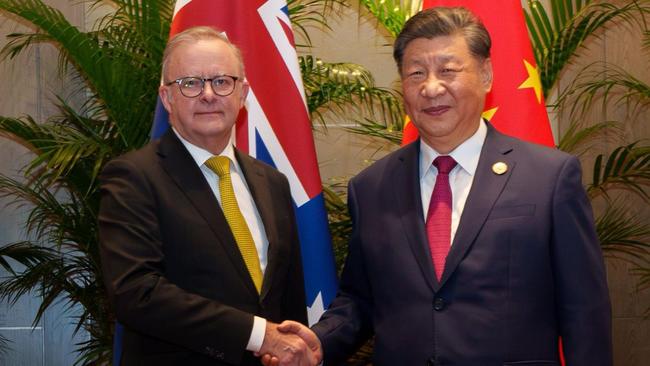
Xi Jinping has urged Anthony Albanese to join him in transforming the China-Australia relationship into a more mature, stable and fruitful partnership that will project “stability and certainty to the region and the wider world” in the wake of Donald Trump’s election victory.
The Chinese President – who has assembled the Communist Party’s highest-ranking officials in South America to launch a charm offensive of world leaders at the APEC and G20 summits – told the Prime Minister that their discussions in Beijing last year had been “very productive over the past year and more”.
Mr Xi and Mr Albanese met at the Chinese president’s Rio de Janeiro hotel, where the Communist leader is receiving world leaders offsite from the G20 summit. Mr Albanese was brought in to meet Mr Xi immediately after British Prime Minister Keir Starmer.
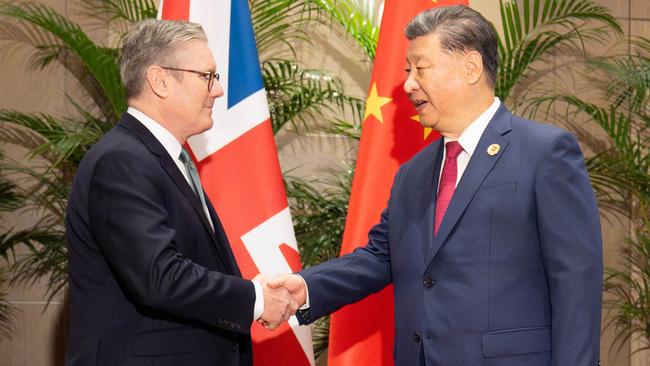
The third bilateral meeting between Mr Xi and Mr Albanese ran for about 30 minutes before the leaders headed in their motorcades to the G20 opening session. Mr Xi’s diplomatic full court press comes amid fears in Beijing of a US-China trade war after Mr Trump pledged to impose 60 per cent tariffs on all Chinese products.
Marking the 10th anniversary almost to the date since he addressed the federal parliament in 2014, Mr Xi told Mr Albanese “we have maintained close communications at all levels, actively promoting the implementations of our common understandings, and made positive progress”.
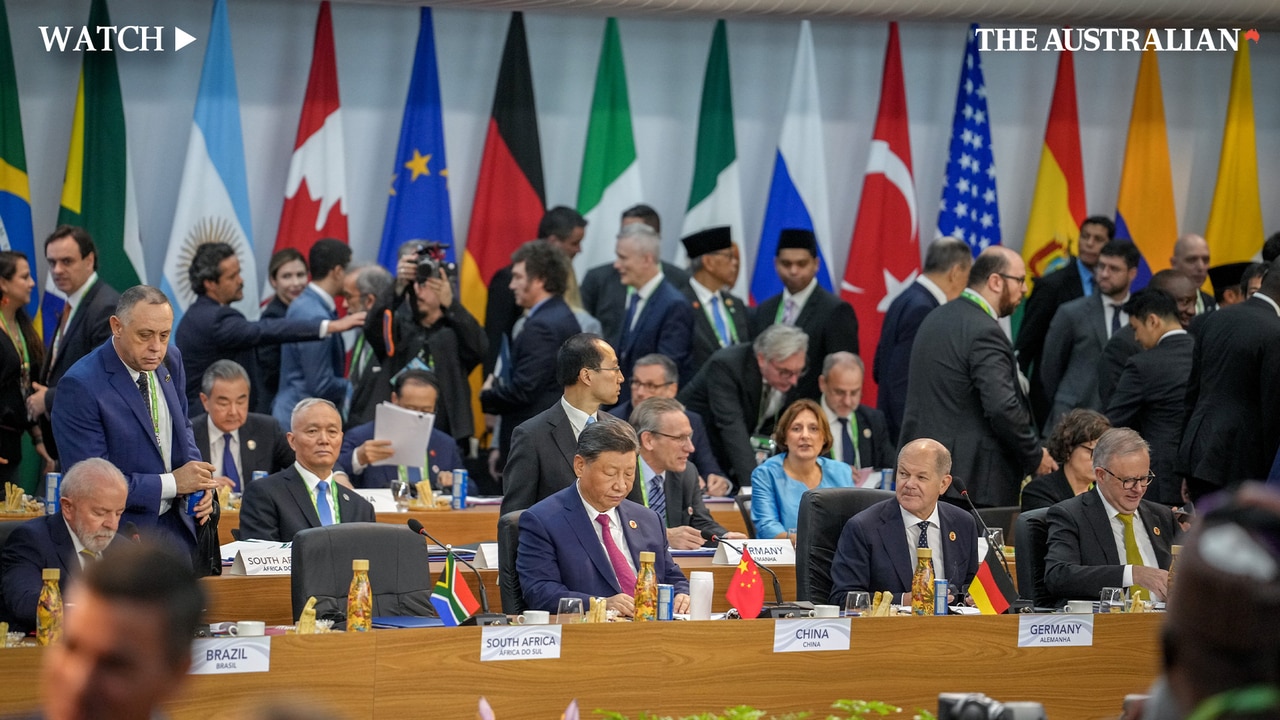
“Ten years ago today, I was on a state visit in Australia. And on this very day, during which our two sides agreed to establish a comprehensive strategic partnership. And over the past decade, we have made some progress in China-Australia relations and also witnessed some twists and turns. That trajectory has many inspirations to offer,” Mr Xi said.
“Now, our relations have realised a turnaround and continues to grow, bringing tangible benefits to our two peoples. So, this is the result of our collective hard work in the same direction, and should be maintained with great care.
“I wish to work with you, Mr Prime Minister, to make our comprehensive strategic partnership more mature, stable and fruitful and eject more stability and certainty to the region and the wider world.”
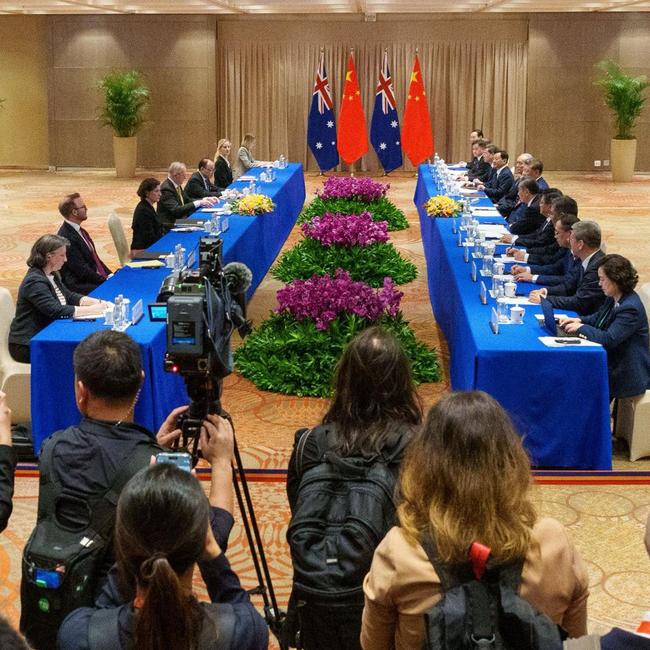
Mr Xi was flanked at the meeting by his most senior ranking officials, including influential Foreign Affairs Minister Wang Yi, powerful Communist Party official Cai Qi, Finance Minister Lan Fo’an, Commerce Minister Wang Wentao, People’s Bank of China governor Pan Gongsheng and National Development and Reform Commission chair Zheng Shanjie. Mr Albanese was joined by foreign policy adviser Kathy Klugman and senior Prime Minister & Cabinet first assistant secretary Pablo Kang.
In opening remarks before the meeting, Mr Albanese thanked Mr Xi for his “tremendous hospitality when I visited Beijing last year”.
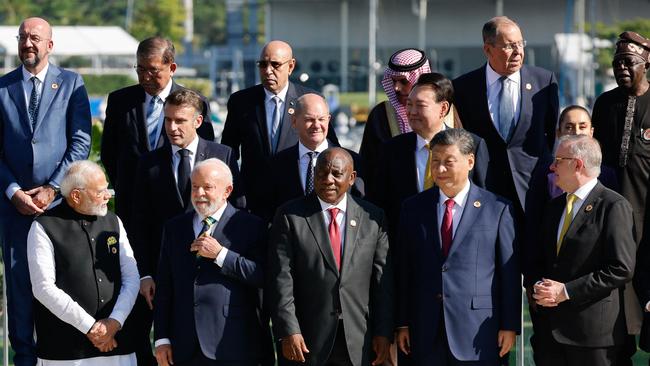
“Since then, there has been further encouraging progress in the stabilisation of our relationship. We’ve resumed a range of dialogues. And the tempo of bilateral visits is increasing.
“Trade is flowing more freely to the benefit of both countries and to people and businesses on both sides. We continue to explore opportunities for practical co-operation in areas of shared interest, including on our energy transition and climate change,” Mr Albanese said.
“Our whole region will benefit from the prosperity that can flow from peace, security and stability in our region. That is why our direct discussions to build deeper understanding on the issues that matter to us are so important.”
Mr Albanese said the rise of China had underpinned the fastest growing region in the world’s history and helped lift the “living standards of hundreds of millions of people through increased economic activity”.
Shortly after the meeting concluded, Beijing mouthpiece China Daily published multiple positive pieces and revealed Mr Xi told the Prime Minister that China and Australia must “strengthen coordination and cooperation, and oppose protectionism”.
Mr Xi is understood to have focused on momentum in the Australia-China relationship and the need to expand ties and investment. The Chinese President’s language was distinctly different compared to their meeting in Beijing 12-months ago.
During last year’s meeting, Mr Xi declared that China and Australia are “embarking on the right path of improvement”. At the G20 meeting, Mr Xi told Mr Albanese that we’ve “realised a turnaround”.
Mr Xi, according to the China Daily, told Mr Albanese “there is no fundamental conflict of interests between China and Australia”.
“Noting that both China and Australia are supporters and defenders of economic globalisation and free trade, he urged the two sides to promote the sharing of opportunities and benefits among various countries via opening up, so as to realize common development,” the article said.
“Noting that the two sides should be firm in expanding the pattern of mutually beneficial and win-win cooperation, Xi said China is willing to import more quality Australian products, encourage Chinese companies to invest and do business in Australia, and hope that Australia will provide a fair, transparent and non-discriminatory business environment for Chinese companies.”
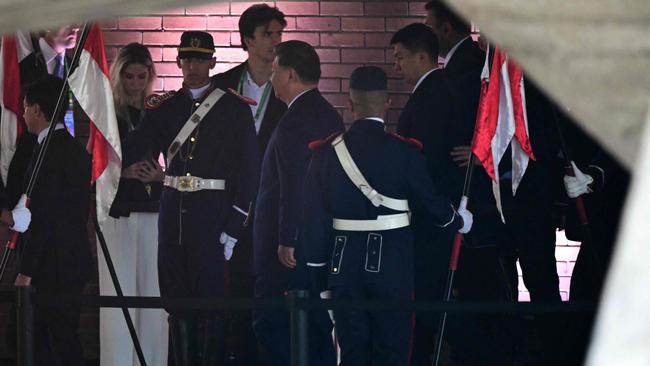
The China Daily articles also revealed what Mr Albanese said in the meeting.
“Albanese said, the Australia-China relationship has made encouraging progress in various areas, including trade, bringing tangible benefits to the two peoples. The Australian side stays committed to the one-China policy, opposes “decoupling”, advocates promoting economic globalization, and hopes to strengthen cooperation with China in such areas as energy transition and climate change.
“Noting that China’s development has made important contributions to the long-term stability and growth of the Asia-Pacific region, Albanese said that Australia appreciates China’s important role in APEC and other multilateral mechanisms, supports China’s role as the host of APEC in 2026, and stands ready to strengthen multilateral communication with China to promote regional peace, stability, prosperity and development.”
In a readout released by the Prime Minister’s Office four hours after the meeting, a spokeswoman said the leaders met for a “stocktake of progress in stabilising relations between Australia and China, including through restoring trade and increasing engagement between our ministers and officials”.
Under existing annual leaders’ meeting arrangements, Mr Xi invited Mr Albanese to visit China next year.
“Leaders agreed on the importance of dialogue, bilaterally and across the Indo-Pacific region. PM Albanese set out Australia’s views on issues affecting regional and international peace, stability and prosperity.”
“They discussed opportunities for practical co-operation in areas of shared interest, including on energy transition and climate change. The PM raised a range of bilateral points, including consular matters as well as people to people links.”
Australian lobsters banned under China’s trade retaliation against the Morrison government are expected to be back on sale in China by year’s end coinciding with the Chinese Lunar New Year. Almost all of the trade bans, excluding a handful of beef producers, have been lifted by Beijing.
Mr Albanese, who was sat between Italian Prime Minister Giorgia Meloni and German Chancellor Olaf Scholz at the G20 summit, spoke with Joe Biden, Emmanuel Macron and Narendra Modi shortly after arriving following the Xi meeting.
While the thawing in the China-Australia relationship under the Albanese government has seen trade flows and high-level diplomatic exchanges resume, Mr Albanese is under pressure to not overstep the mark in overbalancing either the US or Chinese relationships.
The unpredictable style of Mr Trump – who has threatened to slap 60 per cent tariffs on Chinese imports and tariffs of up to 20 per cent on all other imports – has plunged Mr Albanese and Mr Xi into uncertainty ahead of the Republican leader’s second inauguration on January 20.
Mr Albanese and senior government ministers have celebrated China’s lifting of bans on almost $20bn worth of Australian products, after the trade sanctions were imposed indiscriminately and in breach of World Trade Organisation rules as political payback against the former Morrison Coalition government.
In a predictable move last week, Beijing’s China Daily mouthpiece published a gushing editorial praising Mr Albanese’s “strategic autonomy” amid “unprecedented geopolitical complexity and uncertainty”.
The editorial, released amid growing concerns Australia’s ambassador to the US, Kevin Rudd, would struggle to function in his role under a Trump administration, suggested leaders of other US allies should follow Mr Albanese’s lead in balancing relations with China and a second Trump administration.
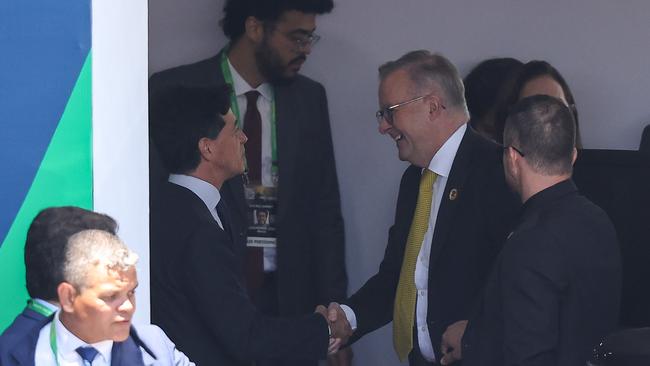
US ambassador to Australia Caroline Kennedy used a speech on Monday to declare America’s commitment to the Pacific, AUKUS and Quad partnership won’t change in a second Trump presidency.
“The United States is a Pacific nation and what happens in this region is of vital national security, economic security, energy security to us,” the outgoing ambassador told the National Press Club in Canberra. “As we have seen with the Quad, as we have seen with critical minerals, and as we have seen … with AUKUS, across the board, the United States has made commitments over many decades and those are not going to change, and our national interest is not going to change.”
In the dying months of his presidency, Joe Biden on Monday (AEDT) made a significant announcement to approve the use of US-supplied long-range missiles by Ukraine in strikes inside Russia.
Mr Biden’s decision on the eve of the G20 summit in Brazil, green-lighting the longstanding request from Ukraine President Volodymyr Zelensky, has been interpreted as a late-term power play to wedge Mr Trump ahead of his January inauguration.
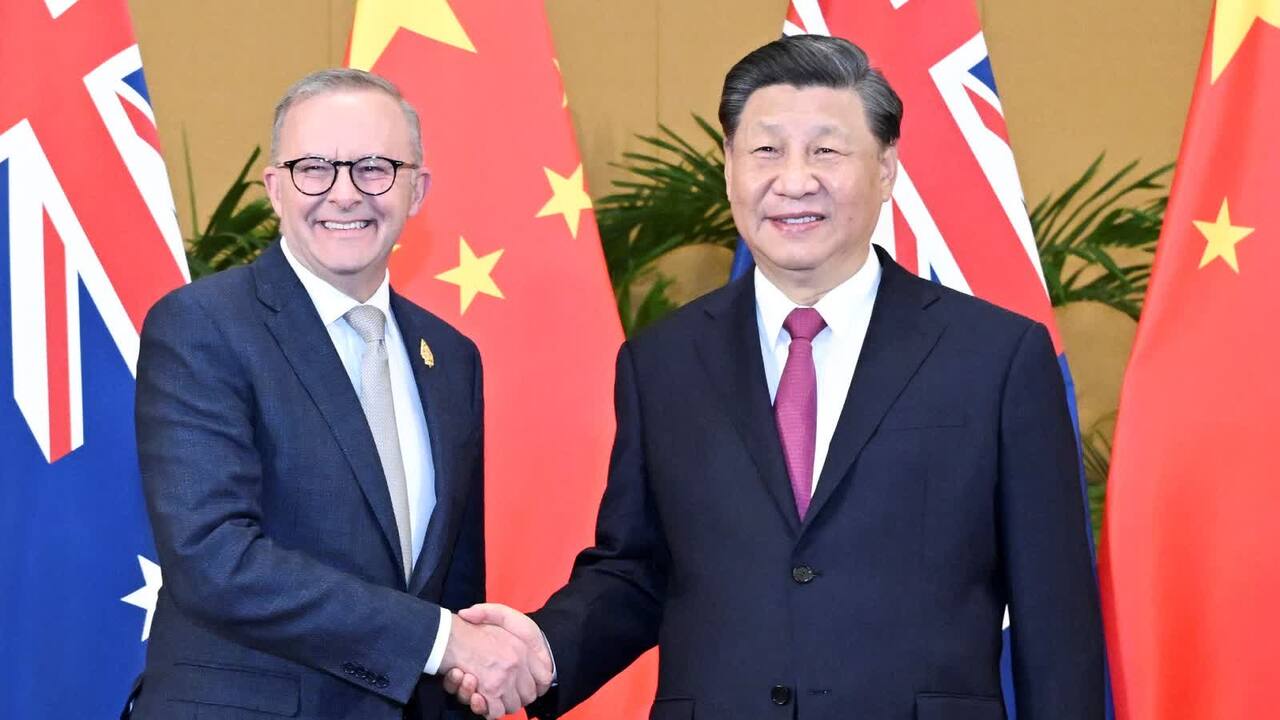
Mr Trump, who has an open channel to Russian President Vladimir Putin and claims he will end the Ukraine war, is expected to dramatically cut overseas US military commitments under his America First 2.0 agenda.
Mr Biden, who turns 82 on Wednesday, is also moving to amplify his climate change agenda at the G20 summit after becoming on Monday the first US president to visit the Amazon. He used the trip to warn that his successor would try, and likely fail, to stop the global rush towards clean energy.
The US, backed by allies including Australia and Britain, will use the G20 summit to rally support in condemning Russia over the invasion of Ukraine and use of North Korean troops, and seek a consensus to de-escalate conflict in the Middle East. In response, China and Russia are expected to lead their G20 allies in blocking or watering down resolutions across a range of issues including Ukraine, the Middle East and climate change.
Ahead of a series of G20 meetings, including with the British Prime Minister, European Commission president Ursula von der Leyen, Brazilian President Luiz Inacio Lula da Silva and Indian Prime Minister Narendra Modi, Mr Albanese kept a low profile on Sunday, attending mass at a local cathedral with fiancee Jodie Haydon.
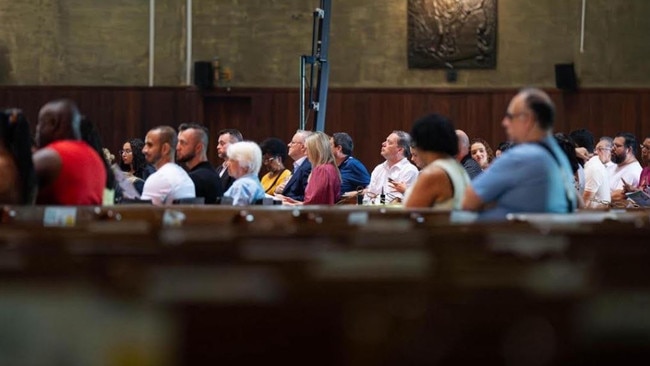
In his first speech to G20 leaders on Tuesday (AEDT), Mr Albanese will push them to back stronger action on Ukraine and the Middle East, and condemn “the illegal and immoral actions of Russia”.
In a speech linking the conflicts to surging global inflation and energy prices, Mr Albanese will use the first G20 session on the “fight against hunger and poverty” to say food security and global hunger are directly connected with international conflicts.
After joining a failed push at the APEC summit in Peru to condemn Russia’s invasion of Ukraine and support calls for de-escalation in Gaza, Mr Albanese will team up with G20 Western powers demanding stronger action from world leaders.
Mr Albanese will say “while peace alone does not guarantee prosperity – conflict always brings poverty”.
“When we are grappling with the big geopolitical and global economic challenges facing our nations we must never lose sight of their impact on our citizens and their daily lives,” he will say.
“Because the hard truth is that in times of global turmoil, it is always those who have the least who are hurt the most. We see that in the shocking loss of innocent life in the Middle East.
“We see it in the ongoing toll that Russia’s invasion is taking on the brave people of Ukraine.”
Mr Albanese will say the G20 presents an opportunity for the international community to “call for a de-escalation of the violence in the Middle East”, and call on world leaders to “condemn the illegal and immoral actions of Russia and indeed North Korea, which is now committing troops to the invasion of a sovereign nation, while its own people starve”.
“Just as we all know that there is a direct connection between these conflicts and a worldwide surge in inflation and energy prices, we should be very clear about the link between international conflict and global hunger,” he will say.
“Because there can be no food security without national and regional security. And while peace alone does not guarantee prosperity, conflict always brings poverty.”
ADDITIONAL REPORTING: Rosie Lewis


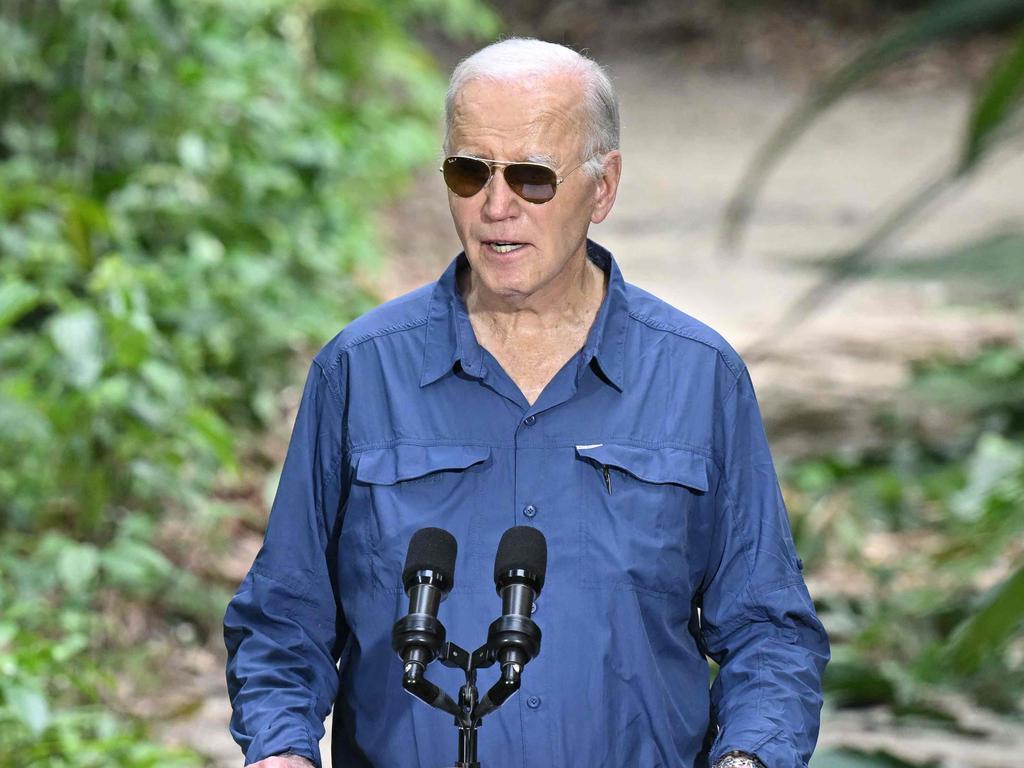

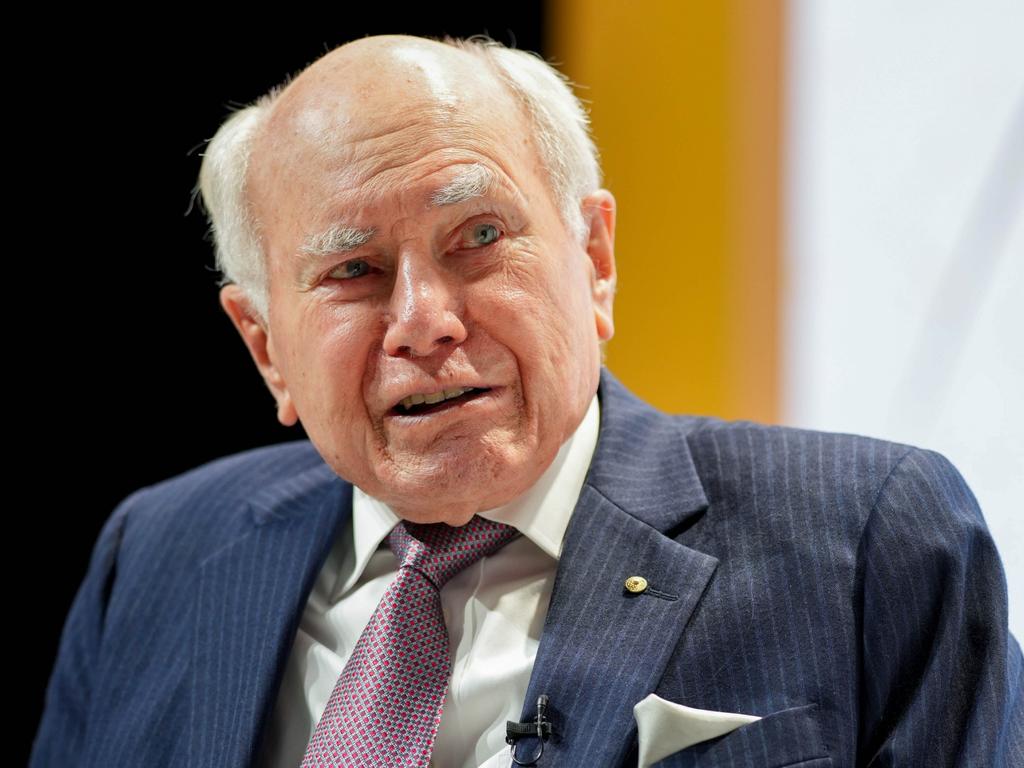


To join the conversation, please log in. Don't have an account? Register
Join the conversation, you are commenting as Logout